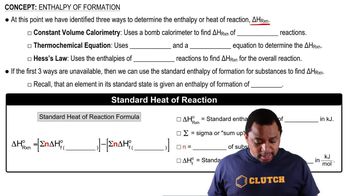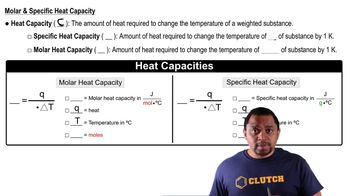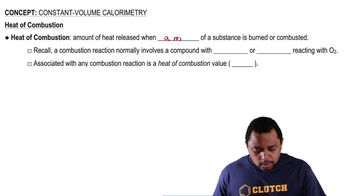Consider the data about gold metal in Exercise 5.26(b). (b) Suppose that the same amount of heat is added to two 10.0-g blocks of metal, both initially at the same temperature. One block is gold metal, and one is iron metal. Which block will have the greater rise in temperature after the addition of the heat?

When a 6.50-g sample of solid sodium hydroxide dissolves in 100.0 g of water in a coffee-cup calorimeter (Figure 5.18), the temperature rises from 21.6 to 37.8 °C (b) Using your result from part (a), calculate H (in kJ/mol KOH) for the solution process. Assume that the specific heat of the solution is the same as that of pure water.
 Verified step by step guidance
Verified step by step guidance
Verified video answer for a similar problem:
Key Concepts
Enthalpy Change (ΔH)

Specific Heat Capacity

Calorimetry

Consider the data about gold metal in Exercise 5.26(b). (c) What is the molar heat capacity of Au(s)?
When a 6.50-g sample of solid sodium hydroxide dissolves in 100.0 g of water in a coffee-cup calorimeter (Figure 5.18), the temperature rises from 21.6 to 37.8 °C (a) Calculate the quantity of heat (in kJ) released in the reaction.
(b) Is this process endothermic or exothermic?
A 1.50-g sample of quinone (C6H4O2) is burned in a bomb calorimeter whose total heat capacity is 8.500 kJ/°C. The temperature of the calorimeter increases from 25.00 to 29.49°C. (b) What is the heat of combustion per gram of quinone and per mole of quinone?
A 1.50-g sample of quinone (C6H4O2) is burned in a bomb calorimeter whose total heat capacity is 8.500 kJ/°C. The temperature of the calorimeter increases from 25.00 to 29.49 °C. (a) Write a balanced chemical equation for the bomb calorimeter reaction.
